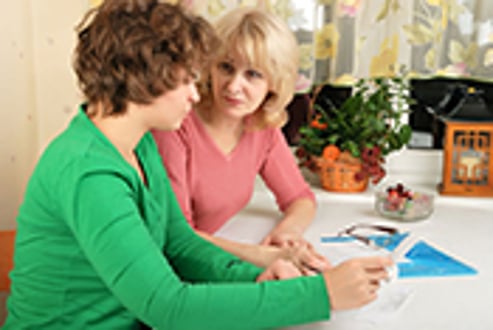Sharing Information With Children
Speaking with Children and Teenagers about Risk
The cancer risks and average age of onset vary by gene mutation. For genes linked to childhood cancers, it is appropriate for children to be tested.
For adult-onset genes, experts typically recommend waiting until after age 18 before deciding about testing. It is most helpful for people to consider genetic testing by the age at which experts recommend beginning screening and prevention.
Regardless of which gene runs in your family, you may find the following topics helpful for speaking with your child about cancer in your family:
Genes linked to childhood cancers
It's appropriate to test children for family mutations in genes that cause young -nset cancers, including the following:
Other mutations can cause childhood cancers. Some require children to inherit a mutation in the same gene from their mother and father. Speak with a genetic counselor to understand whether the mutation family may cause cancer in children.
Are you prepared with the facts?
You may want to review your own understanding about the gene that runs in your family before speaking with your children. You should feel comfortable and confident that you have accurate and understandable facts at hand.
Signs you are confident about your understanding of the facts, include:
- You have talked to experts and gathered the information you need.
- You have practiced explaining the mutation to other people before.
- You have a good understanding of what the mutation means for you and your family.
- You are comfortable talking about it.
Signs that you may need more information or practice explaining, include:
- You find it confusing to explain it to other people.
- You are not really sure what it all means.
- You think you get it but don’t know how to explain it.
Tips for gathering the facts
- Talk to a genetic counselor or other healthcare professional.
- Visit the section of the FORCE website with gene-by-gene information on cancer risks and risk-management guidelines.
- Practice with a friend or relative before your discussion with your children.
- Remember that advances in detection, prevention, and treatment may mean that your child will have different and better options than you or your relatives had.
Are you prepared emotionally?
Signs of comfort with your emotions include:
- You feel calm when you talk about the mutation with others.
- You feel positive about your medical decisions.
- You feel as though the future holds more promise than the past.
Signs that you might not be emotionally ready include:
- The thought that your child may have inherited the mutation is unbearable.
- You get upset when you think or talk about it.
- You try to avoid thinking about it or talking about it.
- You often feel angry, fearful, worried or guilty about your family’s mutation.
Tips to help you prepare emotionally
- Check in on your feelings. How has your family been affected by cancer? How has this shaped your feelings about what the mutation means for you and your children? Thinking about these questions can help you emotionally prepare.
- Think about how you feel about the inheritance issue. If the thought of passing on a mutation fills you with guilt or sadness, you may want to address these feelings with a peer, relative or mental health care professional before talking to your child.
- Be aware of your own feelings and motives. Consider your need to share this information compared to your children’s need to know at this particular time. If you are upset by the information, it may not be the best time to present it to your children.
- Seek support from peers. Join FORCE's moderated message boards, private Facebook group, or virtual support meeting or get matched one-to-one with a peer navigator who shares your situation.
Is your child ready?
Kids value being included in important conversations and may feel left out or upset if not included in discussions about important family issues. Most child would prefer to hear important news – good or bad – from a parent or loved one rather than overhearing the news from another person. Without accurate information, children may form their own faulty beliefs to explain events and feelings. Still, it's important to tailor the information to your child based on their age and maturity.
It may be helpful to think of communication about cancer risk as a gradual process with multiple conversations over time, rather than a one-time event. This will allow you time to assess how much your children understand and how well they may be coping with the information. This also provides them the opportunity to ask you questions.
Having the conversation
Here are some things to consider before having the conversation with your children:
- Where have your best conversations happened? Around the kitchen table, in the car, on a walk?
- When is a good time of day for your child? Weekends or weekdays, in the morning or winding down at night?
- Should the conversation be one-on-one, or should it be with more than one child or other family members?
- Think about how you’ve dealt with other important issues with your child. What worked well during those conversations? How does your child handle “tough stuff”? I
Watch our Video
Sharing Hereditary Cancer Information with Children
In the News
Community Stories
November 20, 2017
September 12, 2018



